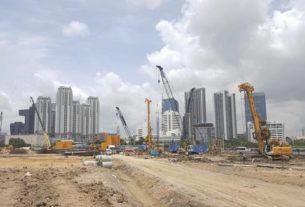The Energy Ministry assured the Cabinet Tuesday that the gas leakage off Rayong’s coast would not lead to higher electricity bills to the public, though several power plants will need to shift to more expensive bunker oil following the suspension of the first gas transmission pipeline.
Government spokesman Panithan Wattanayakorn said that the Energy Ministry assured the Cabinet that all the costs would be passed on to Hyundai, a contractor whose vessel anchor damaged the tubes linking the pipeline.
As such, though bunker oil is replacing natural gas for electricity generation, the additional cost would not be passed on to power users.
“Hyundai’s operations is insured, but the actual damage goes beyond the insurance coverage. Hyundai will need to shoulder the rest,” Panithan said.
The incident took place last Saturday after a Hyundai vessel, which was contracted by PTT, was performing linkage work between pipeline No. 2 and No.3.
The Energy Ministry told the Cabinet that as the pipeline may be suspended for 14 days, power plants deprived of the daily supply of 250 million cubic feet per day will need 120 million litres of bunker oil during the period. This is estimated to cost Bt1.2 billion.
Energy Permanent Secretary Norkun Sitthiphong was summoned to brief the Cabinet on the leakage. He will lead a discussion with PTT, Electricity Generating Authority of Thailand and the Office of the Energy Regulatory Commission on how to address the higher generating cost, due to the shift from natural gas to more-expensive bunker oil.
Following the suspension of the first pipeline which can transmit 850 million cubic feet per day (mcfpd), the ministry has so far devised three measures to divert the negative impacts. First, some 150-200 mcfpd is diverted to the second and third pipelines. Second, natural gas supply to gas separation plants is reduced by 240 mcfpd. Third, liquefied natural gas feed into the pipeline is increased from 140 mcfpd to 300 mcfpd.
Under the measures, some 250-300 mcfpd is missing and to reduce the impacts on power generating, bunker oil will replace natural gas. Ratchaburi power plant will be supplied 1.8 million litres of bunker oil per day and 2 million litres a day later on. An average 1 million litres will be supplied to Krabi power plant, 40 million litres to Phra Nakhon Tai power plant and 5 million litres to Bang Pakong power plant. Capacity utilisation of Nam Ngum 2, Nam Theun 2 and Rajaprapa hydroelectric power plants will be increased. The shutdown maintenance of Mae Moh’s 10th generator and Ratchaburi co-generation plant’s 2nd generator will be postponed. PTT has been accordingly assigned to secure 30 million litres of 0.5per cent-sulfur bunker oil for power generating.
